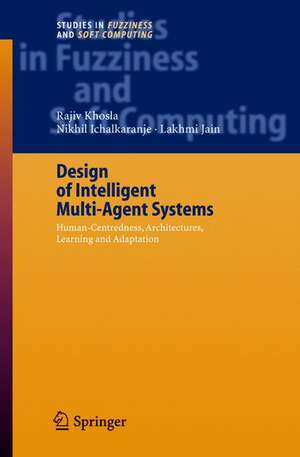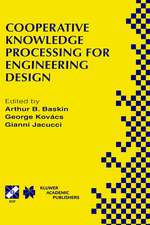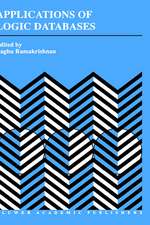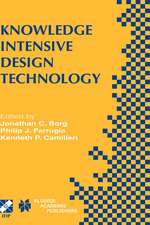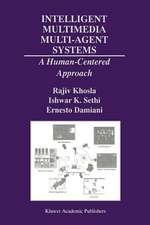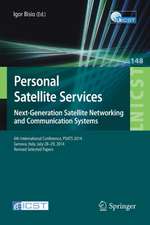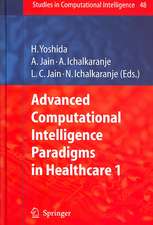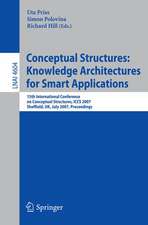Design of Intelligent Multi-Agent Systems: Human-Centredness, Architectures, Learning and Adaptation: Studies in Fuzziness and Soft Computing, cartea 162
Autor Rajiv Khosla, Nikhil Ichalkaranjeen Limba Engleză Hardback – 5 oct 2004
| Toate formatele și edițiile | Preț | Express |
|---|---|---|
| Paperback (1) | 956.74 lei 6-8 săpt. | |
| Springer Berlin, Heidelberg – 21 oct 2010 | 956.74 lei 6-8 săpt. | |
| Hardback (1) | 963.24 lei 6-8 săpt. | |
| Springer Berlin, Heidelberg – 5 oct 2004 | 963.24 lei 6-8 săpt. |
Din seria Studies in Fuzziness and Soft Computing
- 20%
 Preț: 961.00 lei
Preț: 961.00 lei - 20%
 Preț: 627.83 lei
Preț: 627.83 lei - 20%
 Preț: 949.14 lei
Preț: 949.14 lei - 20%
 Preț: 1010.14 lei
Preț: 1010.14 lei - 20%
 Preț: 1008.57 lei
Preț: 1008.57 lei - 20%
 Preț: 1113.52 lei
Preț: 1113.52 lei - 20%
 Preț: 962.94 lei
Preț: 962.94 lei - 18%
 Preț: 917.09 lei
Preț: 917.09 lei - 20%
 Preț: 317.55 lei
Preț: 317.55 lei - 20%
 Preț: 320.37 lei
Preț: 320.37 lei - 20%
 Preț: 958.81 lei
Preț: 958.81 lei -
 Preț: 376.75 lei
Preț: 376.75 lei - 20%
 Preț: 622.77 lei
Preț: 622.77 lei - 20%
 Preț: 947.70 lei
Preț: 947.70 lei - 18%
 Preț: 921.36 lei
Preț: 921.36 lei - 20%
 Preț: 957.69 lei
Preț: 957.69 lei - 20%
 Preț: 960.53 lei
Preț: 960.53 lei - 15%
 Preț: 621.48 lei
Preț: 621.48 lei - 20%
 Preț: 626.38 lei
Preț: 626.38 lei - 20%
 Preț: 959.13 lei
Preț: 959.13 lei - 15%
 Preț: 616.28 lei
Preț: 616.28 lei - 20%
 Preț: 970.52 lei
Preț: 970.52 lei - 20%
 Preț: 954.05 lei
Preț: 954.05 lei -
 Preț: 373.98 lei
Preț: 373.98 lei - 18%
 Preț: 1175.82 lei
Preț: 1175.82 lei - 20%
 Preț: 626.25 lei
Preț: 626.25 lei - 18%
 Preț: 914.66 lei
Preț: 914.66 lei - 18%
 Preț: 911.78 lei
Preț: 911.78 lei - 24%
 Preț: 1142.40 lei
Preț: 1142.40 lei
Preț: 963.24 lei
Preț vechi: 1204.05 lei
-20% Nou
Puncte Express: 1445
Preț estimativ în valută:
170.42€ • 198.55$ • 148.82£
170.42€ • 198.55$ • 148.82£
Carte tipărită la comandă
Livrare economică 17-31 ianuarie 26
Preluare comenzi: 021 569.72.76
Specificații
ISBN-13: 9783540229131
ISBN-10: 3540229132
Pagini: 468
Ilustrații: XVII, 450 p.
Dimensiuni: 155 x 235 x 31 mm
Greutate: 0.84 kg
Ediția:2005
Editura: Springer Berlin, Heidelberg
Colecția Springer
Seria Studies in Fuzziness and Soft Computing
Locul publicării:Berlin, Heidelberg, Germany
ISBN-10: 3540229132
Pagini: 468
Ilustrații: XVII, 450 p.
Dimensiuni: 155 x 235 x 31 mm
Greutate: 0.84 kg
Ediția:2005
Editura: Springer Berlin, Heidelberg
Colecția Springer
Seria Studies in Fuzziness and Soft Computing
Locul publicării:Berlin, Heidelberg, Germany
Public țintă
ResearchCuprins
1. Humanization of soft computing agents.- 2. Software agents for ubiquitous computing.- 3. Agents-based knowledge logistics.- 4. Architectural styles and patterns for multi-agent systems.- 5. Design and behavior of a massive organization of agents.- 6. Developing agent-based applications with JADE.- 7. A collective can do better.- 8. Coordinating multi-agent assistants with an application by means of computational reflection.- 9. Learning by exchanging advice.- 10. Adaptation and mutation in multi-agent systems and beyond.- 11. Intelligent action acquisition for animated learning agents.- 12. Using stationary and mobile agents for information retrieval and e-commerce.
Textul de pe ultima copertă
The ongoing transition of Intelligent Systems Research and in particular the agent based research into the real world has resulted in the emergence of new phenomena distinct from the traditional logic-centered approach. This books focuses on those new trends in design and evolution of the agent technology such as humanization, architectures and learning of agents. "Design of Intelligent Multi-Agent Systems" presents the application of soft computing agents to complex real world problems in distributed environments, humanization of the agents and the optimization of their performance.
Caracteristici
The latest trends in design and evolution of agent technology Includes supplementary material: sn.pub/extras
